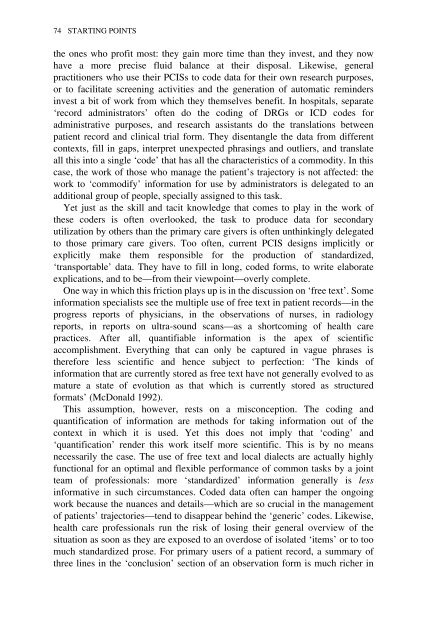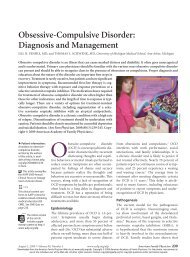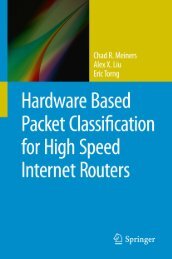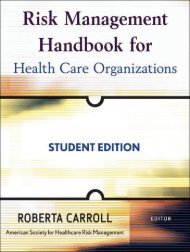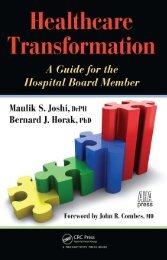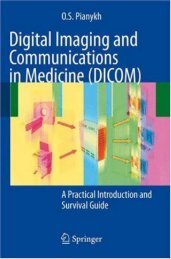Health Information Management: Integrating Information Technology ...
Health Information Management: Integrating Information Technology ...
Health Information Management: Integrating Information Technology ...
You also want an ePaper? Increase the reach of your titles
YUMPU automatically turns print PDFs into web optimized ePapers that Google loves.
74 STARTING POINTS<br />
the ones who profit most: they gain more time than they invest, and they now<br />
have a more precise fluid balance at their disposal. Likewise, general<br />
practitioners who use their PCISs to code data for their own research purposes,<br />
or to facilitate screening activities and the generation of automatic reminders<br />
invest a bit of work from which they themselves benefit. In hospitals, separate<br />
‘record administrators’ often do the coding of DRGs or ICD codes for<br />
administrative purposes, and research assistants do the translations between<br />
patient record and clinical trial form. They disentangle the data from different<br />
contexts, fill in gaps, interpret unexpected phrasings and outliers, and translate<br />
all this into a single ‘code’ that has all the characteristics of a commodity. In this<br />
case, the work of those who manage the patient’s trajectory is not affected: the<br />
work to ‘commodify’ information for use by administrators is delegated to an<br />
additional group of people, specially assigned to this task.<br />
Yet just as the skill and tacit knowledge that comes to play in the work of<br />
these coders is often overlooked, the task to produce data for secondary<br />
utilization by others than the primary care givers is often unthinkingly delegated<br />
to those primary care givers. Too often, current PCIS designs implicitly or<br />
explicitly make them responsible for the production of standardized,<br />
‘transportable’ data. They have to fill in long, coded forms, to write elaborate<br />
explications, and to be—from their viewpoint—overly complete.<br />
One way in which this friction plays up is in the discussion on ‘free text’. Some<br />
information specialists see the multiple use of free text in patient records—in the<br />
progress reports of physicians, in the observations of nurses, in radiology<br />
reports, in reports on ultra-sound scans—as a shortcoming of health care<br />
practices. After all, quantifiable information is the apex of scientific<br />
accomplishment. Everything that can only be captured in vague phrases is<br />
therefore less scientific and hence subject to perfection: ‘The kinds of<br />
information that are currently stored as free text have not generally evolved to as<br />
mature a state of evolution as that which is currently stored as structured<br />
formats’ (McDonald 1992).<br />
This assumption, however, rests on a misconception. The coding and<br />
quantification of information are methods for taking information out of the<br />
context in which it is used. Yet this does not imply that ‘coding’ and<br />
‘quantification’ render this work itself more scientific. This is by no means<br />
necessarily the case. The use of free text and local dialects are actually highly<br />
functional for an optimal and flexible performance of common tasks by a joint<br />
team of professionals: more ‘standardized’ information generally is less<br />
informative in such circumstances. Coded data often can hamper the ongoing<br />
work because the nuances and details—which are so crucial in the management<br />
of patients’ trajectories—tend to disappear behind the ‘generic’ codes. Likewise,<br />
health care professionals run the risk of losing their general overview of the<br />
situation as soon as they are exposed to an overdose of isolated ‘items’ or to too<br />
much standardized prose. For primary users of a patient record, a summary of<br />
three lines in the ‘conclusion’ section of an observation form is much richer in


